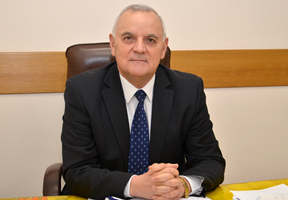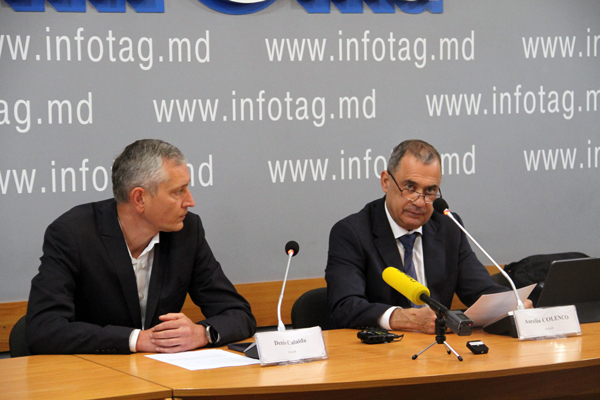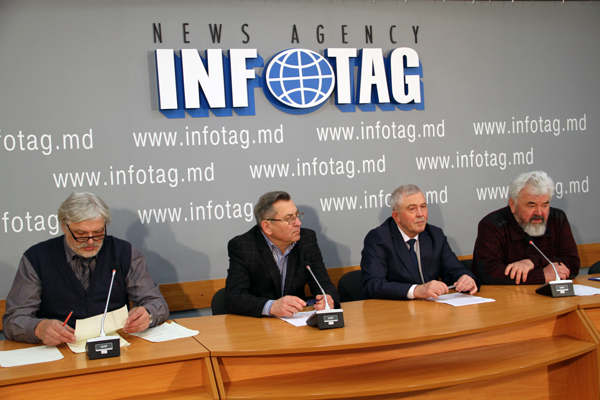Interview
LOOKING FOR A STRATEGIC INVESTOR

Being aware that the time of non-institutional shareholders is becoming history, Moldindconbank's majority shareholders have agreed to attract a strategic investor whom they are ready to sell 50% of shares so that the latter be able to continue to successfully develop the bank. Valerian Mirzac, the chairman of the Board of Directors, says that this could be achieved through direct sale of the existing shares or through an additional issue of shares.
Mr Mirzac, lately the media have been increasingly focusing on the Moldovan banking system and, most frequently, not in positive terms. As a person knowing the situation from the inside, how would you appreciate the current situation in the banking sector?
V.M.: We cannot refer to the Moldovan banking system separately from events taking place in the country and the region. And most of these events, regretfully, cannot be assessed as positive. First of all, it is about the world financial crisis that switched from an acute to a chronic condition, and because of this, the negative influence, including on the Moldovan economy, is quite strong. Apart from the well-known world and regional problems,
What about the famous "billion," did it have any impact on the general situation?
V.M.: It did and, unfortunately, it went far beyond pecuniary losses for our country. In my opinion, the impact on the reputation of
However, against this negative background, the banking sector proved to be stable and continues generating profits and developing. Hence, last year and in the first quarter of this year, the loan and deposit portfolio was on a growing trend. Capital adequacy ratio stands at 27.8%, which is much higher than the minimum level allowed by the NBM (16%) and the
How is Moldindconbank developing in this climate?
V.M.: If looking at the annual dynamics of the structure of assets and liabilities for the last five years, including 2015, we will note that Moldindconbank has undertaken several concrete measures aimed at strengthening the bank and helping it reach a stable financial situation. Over this period, the bank developed faster compared to the average per system, including our main competitors. The bank's total regulatory capital registered a 2.5-fold increase, accounting for over 1.5 billion lei over the mentioned period. Even in 2015, the bank's assets increased by 17.7%, deposits by 31.1%, the increase in Moldindconbank's loan portfolio covered more than half of the loan growth in the banking system. After such a fast growth, the bank developed on an average pace in the first quarter of 2016. At the same time, I would like to mention that over this period of 2016, Moldindconbank registered the highest profits in the banking system before reserves and taxation – 218 million lei. Of this profit, two-thirds were directed to "reserves for possible losses". In these "troubled times", the bank management tries to direct as many means as possible to create reserves, as their availability enhances the protection level of the bank, as well as of its clients from crisis effects. At the same time, Moldindconbank holds now the largest and the most developed network, with 191 branches and agencies across the country serving almost half a million of individuals and legal entities. Moldindconbank is a systemic bank of
Speaking about lending, what do you think about the fact that some experts accuse banks of "parasitizing" on state securities, instead of giving loans to the economy?
V.M. I have already partially answered this question when presenting the growth of the bank's loan portfolio for 2015. I absolutely disagree with claims that banks would be interested in short-term gains only. Since its foundation, Moldindconbank has been an active creditor of the economy. Our bank holds about a fourth of the lending market. The loan portfolio share in all assets represents 55%, which is one of the highest ratios in the banking system. At the same time, any bank needs to consider the diversification of assets. State securities are one of the most liquid and safer assets in any country. I believe that Moldindconbank took the right steps and, as a result, it holds now the largest portfolio of state securities, thus being the government's largest lender among banks. The banking sector must support the government in these difficult times, as this means the payment in due time of pensions, wages and social allowances. Of course, we understand this is a temporary phenomenon, as the government should not balance its budget by constantly growing the public debt.
Certain "guru experts" have kept on repeating in the media some bankers' statements that the state would be unable to meet its obligations on securities. As a citizen of this country and banker whose decisions are based on thorough analysis and intuition, I would like to say that the banks' assistance through the mechanism of state securities is very important and opportune for the state. The bank will further support the state, proceeding from its possibilities and considering all risks. It is our choice and it is reasonable from the economic point of view. Yet, lending does not depend only on the bank's willingness to lend, but also on the possibility of enterprises to absorb loans and to promote far-reaching and profitable projects. Of course, whenever economy slows down and interest rates on loans go up, loan applications are less numerous. We expect a higher interest in loans from individuals and legal entities now that the National Bank of
Returning to the issue of the "billion", would a repeat be possible? To what extent is the National Bank keeping the situation in the banking sector under control and how do you assess the quality of the central bank' supervision?
V.M.: First of all, I would not blame only the National Bank for the "stolen billion". This was possible in
As a result, the US ambassador to Moldova and later the governor of the National Bank said that the situation in these three banks cannot be compared to the situation in the three banks liquidated in 2015 (Banca de Economii, Banca Sociala and Unibank – Profit).
Of course, as a representative of a commercial bank, I would like the National Bank's supervision to last only for a reasonable period of time. But we have an understanding attitude towards such tough requirements imposed on the largest banks of the country, especially given the fact that this is being done in line with recommendations coming from international financial organizations and are related first of all to the quality of shareholders.
Do you meet with representatives of international financial organizations and, if yes, how are relations with them?
V.M.: Moldindconbank is the Moldovan bank that has attracted the largest sum of loans from international financial institutions. This proves that foreign lenders trust our bank and have good relations with it.
Together with Moldindconbank's President Leonid Talmaci, I have recently had meetings with the head of the EU delegation to
Speaking about bank supervision, we have to mention that the IMF has imposed very tough requirements to the Moldovan authorities when it comes to shareholders' transparency. The National Bank has already blocked over 40% of shares of one of the banks. Aren't you afraid that the same scenario could repeat at Moldindconbank?
V.M.: Moldindconbank has now over 900 shareholders, of which 21 hold quotas bigger than 1%. This information, including that about beneficial owners, is open and available on our website. Practically, there have been no changes to the structure of shareholders since 2009 when, at the EBRD's recommendation on transparency, the bank's shareholders registered in off shore zones started the procedure de-offshorerization. Since then, bank's shareholders have been transparent and provided all the required information, including that about beneficial owners. So far, the National Bank has not put forward any official claims to shareholders of the bank, although we know about IMF requirements towards the Moldovan authorities: it is no longer sufficient to know who the beneficial owners are. These beneficiaries have to be checked and approved by the National Bank and only after that they could become full-fledged shareholders of a commercial bank. This means that the National Bank would confirm the full status of each shareholder of the bank, regardless of the number of shares it holds.
It might be a correct approach. Because, for instance when it comes to Moldindconbank there are rumours that the bank belongs to businessman Veaceslav Platon, while a part of shareholders are just a smoke screen?
V.M.: Today, according to the information available to our bank and to the central bank, Veaceslav Platon controls directly and indirectly up to 4.5% of bank's shares. We have to admit that media allegations about this issue create some difficulties for the bank, whereas Mr Platon enjoys free publicity (smiles). These problems were discussed by the National Bank as well. As a result, I once told Veaceslav Platon that, because of him, the bank is facing a number of problems and I suggested him selling his shares. He agreed. But unfortunately, there are no buyers, at least for the time being, that could meet National Bank's requirements.
Do you have any business relations with Mr Platon? Please be honest.
V.M.: I will give you some information and you will draw your own conclusions. I became a shareholder of Moldindconbank in April 1992 and was elected chairman of the bank's Board of Directorsin 1997 (until then I had been deputy chairman of the Board of Directors). I am very grateful to shareholders for that. Veaceslav Platon became a shareholder of our bank only in 1999. We have never had any business relations. In addition, I am the only shareholder who, together with my family business, SC MVI SRL, was confirmed by the National Bank as the shareholder holding a significant stake in Moldindconbank (at that moment, 5% was considered a significant stake). Moreover, in 2008-2009 this issue was also examined by the EBRD which had no objections. But as it is known, the mass media have also had the right to express itself more freely. Now you are the one to draw conclusions.
What is your opinion about the stock market in
V.M.: There is a paradox situation there. Quite a lot of time has passed since the 2008-2009 crisis, but the market has not fully recovered yet. Neither foreign nor local portfolio investors returned to this market although most
It seems that the problem has deeper roots. In my opinion, such factors as the loss of trust in the Moldovan market, the complicated and tough system of owning and trading bank shares, as well as the small market make banks' shares less attractive, including for strategic investors, something we have experienced ourselves.
I guess that with time the central bank's requirements will no longer be so tough, the economy will start growing and banks will register positive trends. As a result, the stock market will recover and influence positively the banking sector.
Is it true that Moldindconbank is seeking to attract a strategic investor?
V.M.: Yes, this is true and the bank has informed society about this through the press. I believe that attracting a strategic investor with good international reputation will have a positive impact on the development of Moldindconbank, as well as on the country's financial and banking sector. Being fully aware that the time of non-institutional shareholders of a financial institution is coming to an end in Moldova, as well as of the fact that the National Bank will continue to tighten its policy, I had consultations with a number of shareholders and agreed on the need to attract a strategic investor that would hold over 50% of bank's shares. This could be achieved through direct sale of shares by some of the existing shareholders or through an additional share issue. But I would like to make it clear from the very beginning that looking for a strategic investor has nothing to do with the need to attract additional capital but only with the desire to attract a major shareholder that would be accepted by the National Bank.
Has the process of attracting a strategic investor been initiated by the National Bank or by the bank itself?
V.M.: I was the one who initiated this process at the end of 2015 based on the reasons stated above. I announced this at the December meeting of the Board of Directors. In 2016 we took concrete steps in this direction.
I informed the management of the National Bank about our intentions and got the necessary recommendations, including those referring to the financial consultant which will be attracted to speed up the process. The matter was accepted by the bank's Board of Directors and by the extraordinary meeting of shareholders from 20 April 2016. So far we have held negotiations with a number of banks and we expect to have some results in the near future. During my recent visit to
I would also like to stress that until a potential strategic investor is identified, the large shareholders are ready to place their shares in trust management for several years in an international company accepted by the National Bank because the process of attracting a strategic investor needs time and security".
























Add Comment